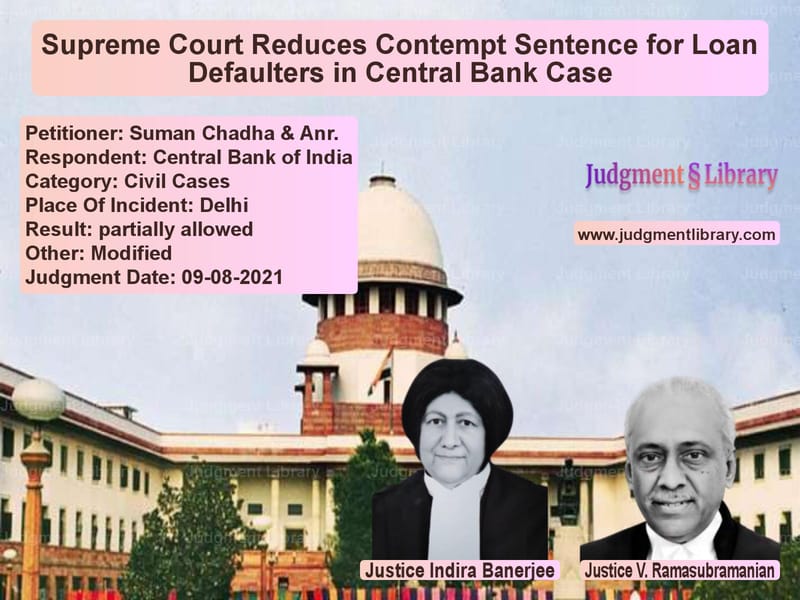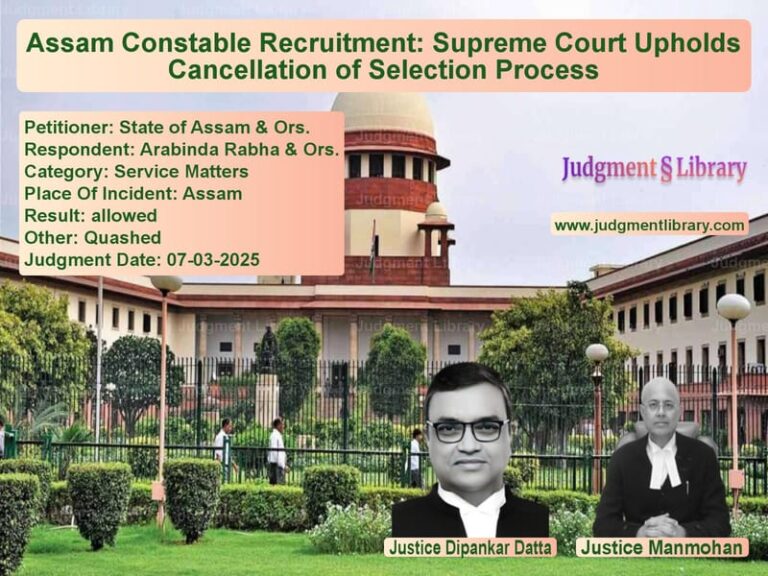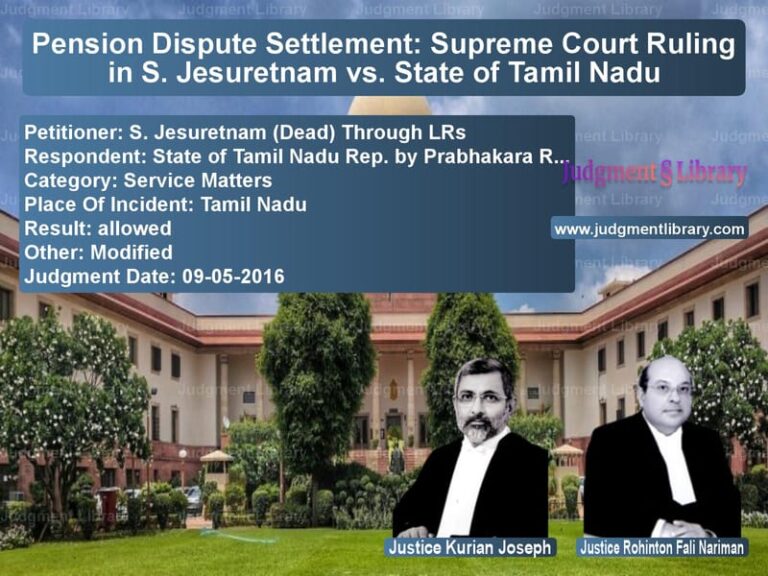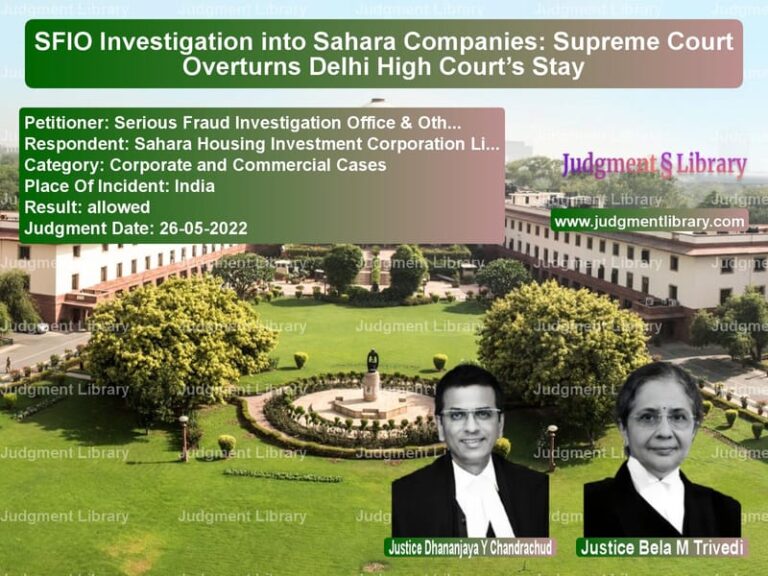Supreme Court Reduces Contempt Sentence for Loan Defaulters in Central Bank Case
The case of Suman Chadha & Anr. vs. Central Bank of India revolved around contempt proceedings initiated against the petitioners for failing to honor an undertaking given to the Delhi High Court. The Supreme Court had to decide whether their non-compliance with the court’s directive warranted the punishment of three months’ imprisonment or if a more lenient view should be taken.
Case Background
The petitioners, Suman Chadha and his wife, were directors of Parul Polymers Private Limited. They had availed a loan from the Central Bank of India, offering immovable property as security. Due to defaults in repayment, the loan was classified as a Non-Performing Asset (NPA) on July 24, 2014. The bank subsequently initiated recovery proceedings under the Securitization and Reconstruction of Financial Assets and Enforcement of Security Interest (SARFAESI) Act, 2002.
The bank issued a demand notice on August 18, 2014, under Section 13(2) of the SARFAESI Act, demanding repayment of Rs. 28,82,25,942.24 plus interest. The bank followed up with a possession notice under Section 13(4), seeking control over the mortgaged properties.
The petitioners challenged the bank’s action before the Debt Recovery Tribunal (DRT), but their plea for interim relief was declined. They then approached the Delhi High Court, where they gave an undertaking to deposit Rs. 7 crores in three installments by June 30, 2015. In return, the High Court granted relief from immediate eviction.
The petitioners, however, failed to honor their commitment, prompting the bank to file a contempt petition. The High Court held them guilty of contempt, sentencing them to three months’ simple imprisonment and imposing a fine of Rs. 2000 each. The Division Bench upheld this ruling, leading to the present appeal before the Supreme Court.
Arguments by the Petitioners
- The petitioners contended that failing to comply with an undertaking should not automatically amount to contempt.
- “The non-compliance was due to financial constraints and not willful disobedience,” argued their counsel.
- The order itself prescribed the consequences of non-payment, allowing the bank to proceed with enforcement actions.
- The petitioners had already lost their properties, which were auctioned by the bank, and had served 11 days in custody.
Arguments by the Respondent (Central Bank of India)
- The bank asserted that the petitioners repeatedly misled the courts to delay enforcement proceedings.
- “They issued post-dated cheques which later bounced, demonstrating clear intent to evade compliance,” the bank argued.
- The petitioners had multiple opportunities to make payments but defaulted at every stage.
- The High Court’s contempt ruling was justified, given the deliberate nature of the breach.
Supreme Court’s Observations
The Supreme Court examined the following key issues:
1. Does failure to comply with an undertaking always amount to contempt?
- The Court ruled that not all breaches of an undertaking amount to contempt, but intentional deception does.
- “Issuing post-dated cheques with no intention to honor them aggravates the offense,” the Court noted.
2. Should imprisonment be upheld despite the auctioning of the properties?
- The Court acknowledged that the bank had successfully recovered its dues by selling the mortgaged properties.
- “The petitioners have already lost their properties and spent 11 days in custody, which is sufficient punishment,” the judgment stated.
3. Can the contempt sentence be reduced?
- The Court took a lenient view considering the financial hardship faced by the petitioners.
- “The sentence of three months is reduced to the period already undergone,” the Court ruled.
Supreme Court’s Judgment
The Supreme Court ruled:
- “The petitioners are guilty of contempt, but their sentence is reduced to the period of imprisonment already served.”
- “There shall be no further imprisonment, and the fine imposed remains unchanged.”
- “This judgment does not affect the bank’s rights under the SARFAESI Act.”
Conclusion
The Supreme Court upheld the finding of contempt while showing leniency in sentencing. The judgment reinforces that compliance with court orders is crucial but also acknowledges mitigating circumstances. The ruling balances the need for accountability with considerations of fairness and financial hardship.
Petitioner Name: Suman Chadha & Anr..Respondent Name: Central Bank of India.Judgment By: Justice Indira Banerjee, Justice V. Ramasubramanian.Place Of Incident: Delhi.Judgment Date: 09-08-2021.
Don’t miss out on the full details! Download the complete judgment in PDF format below and gain valuable insights instantly!
Download Judgment: suman-chadha-&-anr.-vs-central-bank-of-indi-supreme-court-of-india-judgment-dated-09-08-2021.pdf
Directly Download Judgment: Directly download this Judgment
See all petitions in Debt Recovery
See all petitions in Banking Regulations
See all petitions in Damages and Compensation
See all petitions in Judgment by Indira Banerjee
See all petitions in Judgment by V. Ramasubramanian
See all petitions in partially allowed
See all petitions in Modified
See all petitions in supreme court of India judgments August 2021
See all petitions in 2021 judgments
See all posts in Civil Cases Category
See all allowed petitions in Civil Cases Category
See all Dismissed petitions in Civil Cases Category
See all partially allowed petitions in Civil Cases Category







